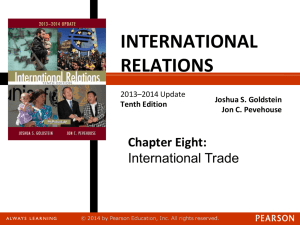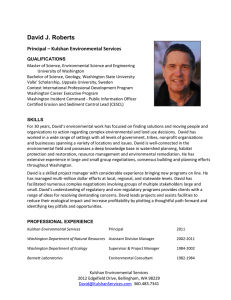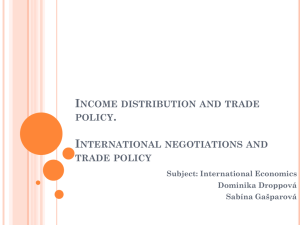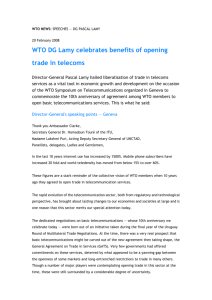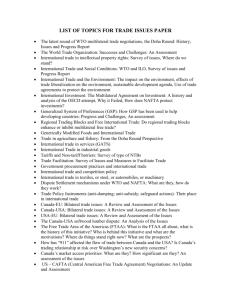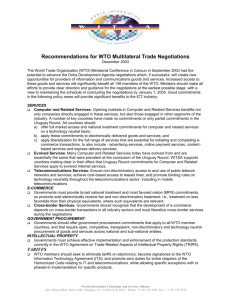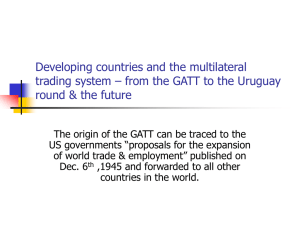UNCTAD Informal Briefing on Climate Change, SDGs and Trade:
advertisement
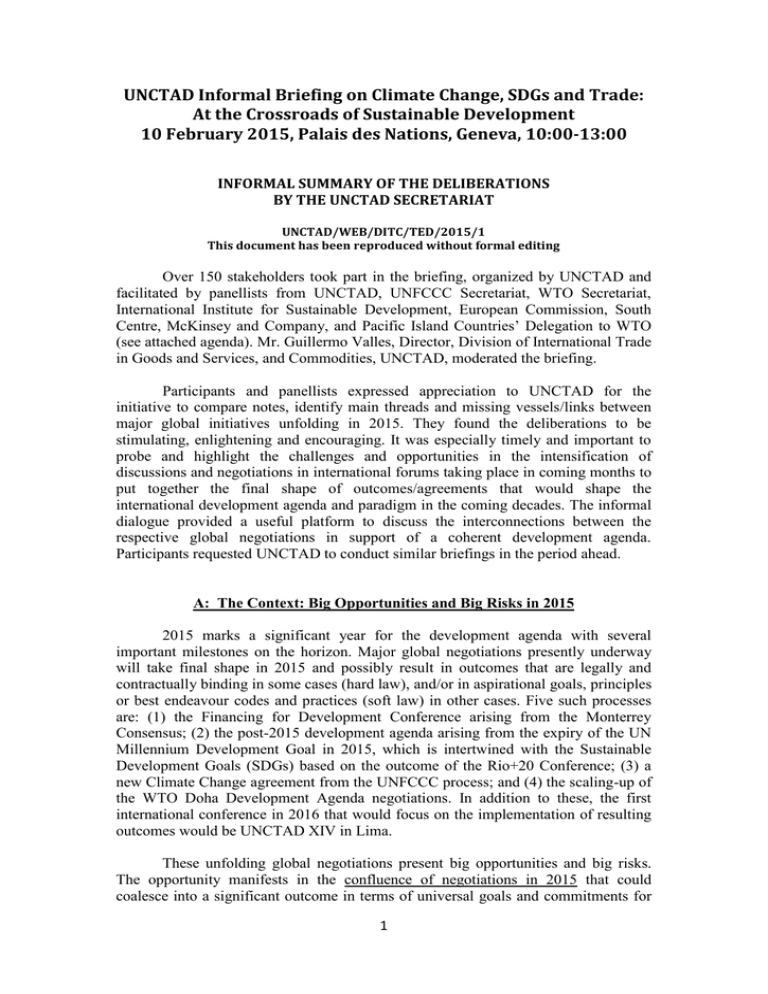
UNCTAD Informal Briefing on Climate Change, SDGs and Trade: At the Crossroads of Sustainable Development 10 February 2015, Palais des Nations, Geneva, 10:00-13:00 INFORMAL SUMMARY OF THE DELIBERATIONS BY THE UNCTAD SECRETARIAT UNCTAD/WEB/DITC/TED/2015/1 This document has been reproduced without formal editing Over 150 stakeholders took part in the briefing, organized by UNCTAD and facilitated by panellists from UNCTAD, UNFCCC Secretariat, WTO Secretariat, International Institute for Sustainable Development, European Commission, South Centre, McKinsey and Company, and Pacific Island Countries’ Delegation to WTO (see attached agenda). Mr. Guillermo Valles, Director, Division of International Trade in Goods and Services, and Commodities, UNCTAD, moderated the briefing. Participants and panellists expressed appreciation to UNCTAD for the initiative to compare notes, identify main threads and missing vessels/links between major global initiatives unfolding in 2015. They found the deliberations to be stimulating, enlightening and encouraging. It was especially timely and important to probe and highlight the challenges and opportunities in the intensification of discussions and negotiations in international forums taking place in coming months to put together the final shape of outcomes/agreements that would shape the international development agenda and paradigm in the coming decades. The informal dialogue provided a useful platform to discuss the interconnections between the respective global negotiations in support of a coherent development agenda. Participants requested UNCTAD to conduct similar briefings in the period ahead. A: The Context: Big Opportunities and Big Risks in 2015 2015 marks a significant year for the development agenda with several important milestones on the horizon. Major global negotiations presently underway will take final shape in 2015 and possibly result in outcomes that are legally and contractually binding in some cases (hard law), and/or in aspirational goals, principles or best endeavour codes and practices (soft law) in other cases. Five such processes are: (1) the Financing for Development Conference arising from the Monterrey Consensus; (2) the post-2015 development agenda arising from the expiry of the UN Millennium Development Goal in 2015, which is intertwined with the Sustainable Development Goals (SDGs) based on the outcome of the Rio+20 Conference; (3) a new Climate Change agreement from the UNFCCC process; and (4) the scaling-up of the WTO Doha Development Agenda negotiations. In addition to these, the first international conference in 2016 that would focus on the implementation of resulting outcomes would be UNCTAD XIV in Lima. These unfolding global negotiations present big opportunities and big risks. The opportunity manifests in the confluence of negotiations in 2015 that could coalesce into a significant outcome in terms of universal goals and commitments for 1 inclusive and sustainable development. Much has been achieved in the past decades, including under the framework of the UN Millennium Development Goals (MDGs). But achieving human development and a life of dignity without poverty remains a global and local challenge. Most countries and stakeholders are committed to attaining robust outcomes in the different negotiations. It is recognized that the world is changing and the development goals being shaped, such as SDGs, are going to be global and will involve all countries. Going alone is not an option when confronting the complex global challenges. Moreover, not reaching outcomes in the global negotiations is also not an option. It would be a disappointing setback for all. For some, like Pacific Islands States for example, the global agenda is not just an economic, social and environmental consideration but also an existential one of life and death, especially as regards climate change and global warming. Pacific Leaders have identified climate change as the single most important challenge facing their countries as it undermines their efforts to attain sustainable development. A recent Asian Development Bank report estimated that Papua New Guinea, the largest island and economy among the Pacific Islands States, would suffer from climate change effects a loss of up to 15% of GDP by 2100. The impact would be greater for the other small island States. Outcomes in the global negotiations are thus required to arrest such disastrous effects. The challenge is that the outcomes should be robust enough to bring about real and lasting results in overall human development. Development is the top priority for developing countries for example. But, it must be recognized, there are underlining tensions that stifle some countries from taking more ambitious stands. For example, some LDCs, like Sierra Leone, are committed to universal goals of sustainable development. The dilemma they face is exemplified in the area of energy where they would need to reduce the use of fossil fuel and increase the use of renewable energies. However the latter can be more expensive which can increase the vulnerability of their already weak economies by undermining competitiveness. Special and differential treatment must be provided to LDCs to access renewable energy, including easy access to funding sources. Creativity is needed to assist developing countries in accessing technologies that can help to access renewable energies and linking the cost of doing so with the cost of climate change rather than the cost of fossil fuels. On the other hand, some countries’ commitments are not ambitious. It was noted, for example, that targets on reducing GHG emissions in limiting global temperature increase to 2°C (relative to pre-industrial levels) as called for in the Fourth Assessment Report of the Intergovernmental Panel on Climate Change (IPCC) should be in the range of 80-95% for industrialised countries by 2050. Past experiences with global negotiations in climate change, trade and global development goals have also had disappointing (or lack of) results that has affected their ambition and implementation. Given however that the stakes are high and the choices faced are stark, strong and decisive leadership and wisdom must be displayed to confront the complex global challenges, find common grounds and move forward together. The outcomes should also include vigorous follow-up implementation and accountability frameworks. Accountability framework such as the proposed the High Level Political Forum for reviewing progress in implementing the SDGs should have 2 both positive aspects (rewarding countries for meeting their commitments) and negative aspects (chastising countries that are faltering). As regards implementation, the importance of supportive complementary frameworks cannot be overemphasized such as adequate financial resources (domestic and international including FDI), technology transfer, capacity building, aid for trade etc. The sequencing of the global negotiations is also important. The FfD Conference will take place in Addis Ababa in July; the post-2015 development agenda is to be adopted by a UN Summit in New York in September; a new climate agreement is to be adopted by COP21 of UNFCCC in Paris in November-December; and the WTO Ministerial Conference in Nairobi in December. A positive and robust outcome to the FfD conference will set the basis and create a positive environment for having better SDGs, which could in turn improve the environment for a climate agreement and for the WTO Doha agenda. The fact that the global negotiations are sequenced to be concluded at different times and in different places, but are being conducted in parallel with limited or no linkages is a major challenge in terms of fashioning a common, coherent and impactful development agenda. It was noted for example that international trade was not visibly discussed in the post-2015 development agenda process and climate change negotiations. It is thus highly important to build bridges between different policy dialogues on climate change, sustainable development and trade, to ensure a systematic, coherent and effective approach. It was stressed that the time for taking actions has arrived so the international community needs to move from debate into actions. A failure to do so in the negotiations by coming up with robust results, including follow-up implementation and accountability frameworks, would be a failure by the international community in its duty to foster a new development agenda and save the world for the present and future generations. It would cast a shadow over efforts to build a better world for all. B: Some of the Key Issues Today Some of the key issues being negotiated in the different negotiating forums in run-up to the concluding meetings of their governing frameworks were highlighted. Post-2015 Development Agenda and SDGs The United Nations Summit planned for 25-27 September in New York will adopted the new post-2015 development agenda including sustainable development goals. Based on the Rio+20 outcome on SDGs, work undertaken by the Open Working Group of the UN General Assembly resulted in the formulation of 17 SDGs with 169 associated specific targets. The UN General Assembly endorsed the proposals of the OWG. Unlike the MDGs that were focused on the social dimension of development, the SDGs include significant aspects of the economic and environmental dimensions of sustainable development. It provides a more balanced treatment of all three pillars of sustainable development. The key issues of social, economic and environmental development being addressed in the post 2015 agenda 3 are encapsulated in an integrated set of six essential elements identified in the UN SG's synthesis report namely: 1. Dignity: to end poverty and fight inequalities; 2. People: to ensure heathy lives, knowledge and the inclusion of women and children; 3. Prosperity: to grow a strong, inclusive, and transformative economy; 4. Planet: to protect our ecosystem for all societies and our children; 5. Justice: to promote safe and peaceful societies and strong institutions; 6. Partnership: to catalyse global solidarity for sustainable development. The forthcoming UN Summit could craft the preamble to the goals, which would identify the board vision and principles on which the goals are based. These would be as important as the goals themselves. Such vision and principles could draw upon, inter alia, the UN Secretary-General's synthesis report namely "Road to dignity by 2030: ending poverty, transforming all lives and protecting the planet" and the work of the Intergovernmental Group of Experts on Sustainable Development Financing. The work of the latter would also feed into the Financing for Development Conference in Addis Ababa (13-16 July) to generate ideas and solutions on financing development in the post-2015 period from domestic and international sources, and from the public and private sector. New Climate Agreement The COP of UNFCCC are working towards adopting a meaningful agreement on climate change at the end of this year in Paris from 30 November to 11 December which will be implemented from 2020, setting the world on a course to limiting the global temperature to 2 degrees Celsius. COP 21 in Paris is not intended to be the end of a journey, but rather a major milestone in charting a course that can be followed by governments and businesses towards an orderly planned transition over time to a low carbon society. Its conclusion is thus a stepping-stone towards building climate resilient societies and economies. The road to Paris has been paved by several decisions over the years including the Cancun Conference in 2010, the Durban Conference in 2011, and the Lima Conference in 2014 dealing with aspects of the pillars of climate change namely mitigation, adaptation, finance, technology and capacity building. In addition, the UN Secretary General convened a Climate Summit in September 2014 in New York, which rallied support among leaders for a conclusive outcome on climate change. The climate change negotiations are very complex and intense, with linkages to other negotiations as well. Parties are grappling with several issues as they work towards an agreement in Paris that would set the framework for climate policy in the period ahead and foster the transition to climate friendly growth paths. Parties are striving for an effective agreement. Some of the key issues on the table include: a. Differentiation: Whether and how the principle of common but differentiated responsibilities should be included in the 2015 agreement and in regards to INDCs (Intended Nationally Determined Contributions). b. Legal parity between mitigation and adaptation as well as between mitigation and means of support, 4 c. The role of the UNFCCC and its principles and provisions in the new agreement. d. The role of market mechanisms and carbon pricing policies. Some options are on the table that would facilitate the use of markets post-2020. It was expressed that there are some gaps that need to be closed in the negotiations on such issues as adaptation, technology transfer, capacity building and the green climate fund (with limited financial capacity as compared to the amount of fossil fuel subsidies). It would seem some parties have not fulfilled many pledges and this raises an issue of trust in the commitments. There is still debate on whether the new agreement should be a legally binding one or not. There is, however, some optimism regarding the outcome of the negotiations. Advancing the WTO Doha Development Agenda At the WTO, intensive negotiations are taking place to craft a work programme on the remaining issues of the Doha round of multilateral trade negotiations with the aim of strengthening the multilateral trading system to meet the challenges of sustainable development. International trade and the WTO can bolster global efforts to combat climate change and to achieve sustainable development goals, as recognized in the proposed SDGs (Goal 17 for example). Where do the Doha negotiations stand and what are the key issues? The negotiations progressed significantly in late 2013 with the adoption of the so-called “Bali package” at the WTO Ministerial Conference in Bali in December 2013. The package included specific and tangible results in certain areas of agriculture and development, and on trade facilitation. Trade facilitation is the first multilateral trade agreement in the WTO’s 20-year history. Its ratification by WTO members is underway. Building on Bali, WTO members are engaging constructively on establishing a work programme on the remaining issues of the Doha round by a new target date of July 2015. Intensive negotiations to craft this work programme are taking place on each of the core Doha areas of agriculture, non-agricultural market access and services, and in the various negotiating groups on Doha issues, including renewed talks on environmental goods and services, to move from ideas to proposals. C: Breaking the silos in international negotiations for the new sustainable development agenda and finding the connecting vessels As global negotiations unfold, it is critically important to ensure that the outcomes of the respective processes fully support each other in order to seize the unique opportunity to usher in a new era of sustained and inclusive economic growth, social development, and environmental preservation and sustainable use. International trade, with globalization, is one of the major 'connecting vessels' that can act as the bridge between the different global agenda setting processes. Yet international trade and trade policy is not adequately addressed. In the proposed SDGs, there are specific references to trade in some of the goals and implicit references in others. In goals 2 (hunger), 3 (health), 8 (economic growth), 10 (inequality), 12 (sustainable production and consumption), 14 (oceans), 5 15 (ecosystems) and 17 (means of implementation), there trade policy issues are identified specifically in contribution to these goals achievement. In goals 7 (energy) and 16 (peace), there is implicit reference to trade. And in goals 1 (poverty), 4 (education), 5 (gender), 6 (water and sanitation), 9 (infrastructure), 11 (cities) and 13 (climate change), there is no specific reference to trade although it can be deduced from some of the targets for these goals that international trade can make a contribution. For example target 13.2 of Goal 13 is to "integrate climate change measures into national policies, strategies, and planning" which would, inter alia, imply integrating climate change into trade and other macro-economic policies. A critical aspect to strengthening the linkage between the SDGs themselves and between them and international trade in particular resides in an accountability framework. This is foreseen in the High-level Political Forum. However the forum as constituted is primarily a review mechanism rather than accountability one. Nevertheless, the reviews at national, regional and global levels would need to examine not only the progress on implementing each of the goals, but how the synergy between the goals is enhanced through implementation and the contribution that trade is making. Such reviews or accountability should be undertaken within the positive framework of recognizing countries that are meeting the goals and encouraging those that are lagging behind. More broadly, a re-think of the economic system that would deliver more sustainable and inclusive development may be required. In this regard, the concept of the 'circular economy' is one possible 'out-ofthe-box' model. Unlike linear economies where wasteful processes occur, in a circular economy restoration are created by intent and design and thereby realizes growth with low or no environmental footprints. As regards the issue of international trade in the context of the UNFCCC, Parties recognized it as an issue which was relevant to the climate change agenda and therefore reflected it in the principles of the Convention in 1992 (Article 3.5). The principle is supportive of the promotion of an open economic system and specifically that measures taken to combat climate change, including unilateral ones, should not constitute a means of arbitrary or unjustifiable discrimination or a disguised restriction on international trade. Subsequently it was also reiterated in the Kyoto Protocol (Article 2.3) in that implementing parties should minimize adverse effects on international trade and social, environmental and economic impact on other Parties. In the current negotiations on the new climate agreement so far, there has been no agreement by Parties to engage in discussions on trade as their focus is on issues that are predominantly related to climate change. There are however several topics under discussion in the negotiations where the linkage with trade is evident: Carbon markets - carbon is traded as a commodity e.g. in Emissions Trading Response Measures – these are measures put in place to address climate change that can have an adverse impact on the social and economic development of other countries. Agriculture – The agriculture sector has experienced and will continue to feel the effects of climate change. This therefore has an impact on the trade of agricultural products. Bunker fuels – This refers to fuels used in international transport, particularly maritime shipping and aviation. Regulation of emissions from these sources 6 has a direct impact on the cost for moving goods and people, which impacts on trade. Small Island Developing States, usually located in remote locations, would be particularly vulnerable to higher transport costs; and Technology – where IPRs are seen by some as barriers to technology transfer, deployment and diffusion Synergies also exist with other multilateral processes – such as the SDGs, biodiversity, desertification, the Montreal Protocol on Ozone Depleting Substances, and trade to name a few. Acknowledging the linkages and synergies and addressing all of these issues in a systematic and coordinated manner is an important. It would appear that there are three stages to the evolution of interconnections between trade and climate change. In the early 1990 (the Convention years), the focus was on how trade-related measures to address climate change would be dealt with. In the mid-2000s (the Kyoto Protocol years), trade and competitiveness issues in emissions reduction related measures were highlighted. In the current period (new agreement or protocol), more transformational issues are at stake and hence the big issues of national contributions, shared prosperity, adjustment challenges and financing. In this light, there is need for leadership to reaffirm and uphold the need for a new accord to guide transition into low carbon economy. The WTO Doha round includes a trade and environment chapter, but climate change is not part of it per se. There are several provisions in the WTO rulebook that may be relevant to key national mitigation measures such as carbon taxes, carbonfriendly labels and standards, and green subsidies. It's Committee on Trade and Environment (CTE) serves as a venue for constructive dialogue among its members on the links between trade and the environment. In addition the work of the WTO Committee on Technical Barriers to Trade is relevant to climate change in such areas as its extensive discussions on energy efficiency labelling and other product related environmental requirements with a view to ensuring that these measures do not create unnecessary obstacles to trade. Moreover, WTO has a highly developed institutional framework to promote transparency, mutual understanding and cooperation on a broad range of trade and trade-related issues relevant to climate change. It is, in essence, an incubator of ideas on how to improve trade policies in a way that makes them more supportive of environmental sustainability. The WTO's trade and environment negotiations can assist global efforts on climate change. A major focus of the negotiations has been to achieve fewer and lower trade barriers applied to environmental technologies embedded in goods or services. Reducing trade barriers on climate-friendly products should reduce the price and facilitate access to these products by a larger number of countries. WTO members have tabled many proposals to advance the multilateral negotiations on environmental goods. To date, the crux of these negotiations has revolved around the coverage of the agreement. Parallel to the multilateral negotiations, in July 2014, a subset of WTO members formally launched their own plurilateral process to liberalize trade in environmental goods, building on an agreement by APEC economies to reduce tariffs on a list of 54 environmental goods. Discussions between WTO members have also focused on the relationship between the WTO and Multilateral Environmental Agreements (MEAs). The outcome of these negotiations would formalize existing cooperation between the WTO and MEA secretariats, including UNFCCC. In 7 addition, it would establish concrete means to avoid potential conflicts between WTO and MEA rules, for example by strengthening national cooperation between trade and environment government agencies. These would comprise key aspects of an enabling WTO framework for tackling climate change. The challenge for the WTO in terms of systemic coherence with other global framework is that if the post-2015 development agenda and climate change agreement require bold actions, to what extend is the WTO ready to look back at its agreements to modulate them to fit the new development architecture that emerges. The WTO may have to show some flexibility in this regard in terms of both its agreements and the institution is being fit for the post-2015 era. This overarching aspect could be a feature of a successful outcome of the WTO's Ministerial Conference in Kenya. Beyond the multilateral trading system, the competitiveness of production of countries and capacities to diversify their economies would be affected by climate change including in terms of disrupting comparative advantage dynamics in food production for example. Such effects could be policy measures such as carbon border adjustment taxes, or natural phenomena such as changing weather patterns affecting food production. Concluding points The year 2015 is significant in marking a turning point in the crossroads to sustainable development. The negotiations on the post-2015 development agenda and SDGs, financing for development, climate change, and multilateral trade that address very complex issues in their own domains are expected to be concluded. Each of these paths is not an end in itself, rather it is an endeavour to secure a global agreement, with effective means of implementation that will set the policy, legal, financial and institutional basis for transformational shifts in societies, economies and the natural environment, leading toward more inclusive and more sustainable development and poverty alleviation. The stakes are high and the road to Addis Ababa, New York, Paris and Nairobi provide an unprecedented opportunity for all countries, peoples, businesses and institutions to join together and act collectively in confronting the increasingly complex and irreversibly interconnected challenges and risks, and taking full advantage of emerging opportunities, from the respective global initiatives. 8 Climate Change, SDGs and Trade: At the crossroads of sustainable development UNCTAD Informal Briefing 10:00 to 13:00, 10 February 2015 Palais des Nations - Room XXVI Geneva, Switzerland Provisional Agenda 10:00 - 11:00 Key note addresses Mr. Guillermo Valles, Director, Division for International trade in Goods and Services, and Commodities UNCTAD Ms. Karen Smith, Senior Member of Negotiations Support team, UNFCCC Mr. David Shark, Deputy Director-General, WTO 11:00 - 13:00: "Davos-type" interactive debate Mr. Mark Halle, Vice President, International Institute for Sustainable Development (IISD) and Executive Director of IISD-Europe Ms. Miriama Williams, Senior Programme Officer, South Centre Mr. Jacob Werksman, Lead Climate Negotiator, European Commission Ms. Helga Vanthournout, McKinsey Global Institute, Geneva Ms. Mere Falemaka, Permanent Representative of the Pacific Islands Forum to the WTO. 9

